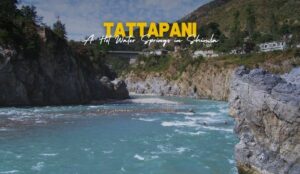"Amid Himalayan peaks it gracefully winds, Pindar River's story, nature's tale it binds"
The world is dotted with breathtaking natural wonders that captivate our hearts and souls. One such enchanting marvel is the Pindar River, a true gem nestled in the lap of nature. In this article, we will embark on a journey to uncover the mesmerizing beauty, rich history, and ecological significance of the Pindar River.
The Origins and Flow of the Pindar River
A Glimpse into the Source
The Pindar River finds its origins in the majestic Himalayan mountains, a cradle of numerous awe-inspiring landscapes. Born from the melting glaciers, the river commences its journey as a pristine stream, glistening under the sun.
The Meandering Path
As the river flows through the rugged terrain, it charts a meandering path that adds to its allure. The journey is a blend of tranquil stretches and spirited rapids, making it a haven for adventurers seeking both serenity and excitement.
Cultural and Historical Significance
Mythological Connections
The Pindar River has woven itself into the tapestry of local mythology and culture. Legend has it that the river was named after Pindar, a revered poet from ancient times. The tales of gods and heroes often intersect with its waters, adding an aura of mystique.
Ancestral Traditions
For the communities residing along its banks, the Pindar River is more than just a geographical feature. It’s a lifeline that sustains generations, providing water for irrigation and daily needs. The river’s banks also bear witness to rituals and ceremonies that celebrate the connection between humans and nature.
Ecosystem and Biodiversity
Flourishing Flora and Fauna
The Pindar River basin is a treasure trove of biodiversity. Lush forests, alpine meadows, and vibrant aquatic ecosystems thrive in its embrace. From elusive Himalayan wildlife to a myriad of fish species, the river supports a delicate balance that exemplifies the circle of life.
Conservation Efforts
In recent years, concerted efforts have been made to preserve the fragile ecosystem of the Pindar River. Conservation projects and awareness campaigns aim to safeguard the diverse species and habitats that call this region home.
Choosing the Ideal Time to Experience Pindar River’s Splendor
Spring Delights (April to June)
The period from April to June marks the onset of spring, making it an ideal time to visit the Pindar River region. During these months, the weather is pleasant, with the chill of winter giving way to milder temperatures. The surrounding landscapes come alive with a riot of colors as flowers bloom, and the river flows gracefully through the terrain.
Monsoon Charms (July to September)
The monsoon season, spanning from July to September, brings a unique charm to the Pindar River. While the rainfall may be intense at times, it breathes new life into the region’s flora and fauna. The lush greenery and cascading waterfalls create a mesmerizing backdrop, offering a different perspective of the river’s beauty.
Autumn Magic (October to November)
As the monsoon bids adieu, the months of October and November usher in the enchanting season of autumn. The weather remains pleasant, and the landscapes undergo yet another transformation. The foliage takes on warm hues of red and gold, casting a magical spell over the entire area.
Winter Serenity (December to February)
For those seeking a serene winter escape, the months of December to February are an excellent choice. While the temperatures can be chilly, the clear skies and crisp air provide a unique charm. The snow-capped peaks of the Himalayas create a stunning backdrop, and the river’s flow remains tranquil and soothing.
How to Reach Pindar River
By Air
The most convenient way to reach the Pindar River region is by air. The nearest major airport is Jolly Grant Airport, located approximately 242.1 km from the river. From the airport, you can hire a taxi or use local transportation to reach your desired destination along the river’s banks.
By Rail
If you prefer train travel, you can reach the Pindar River region via Rishikesh Railway Station. Several trains connect Rishikesh to major cities and towns across the country. Once you disembark, local transportation options like buses and taxis are available to take you to the river’s enchanting surroundings.
By Road
For those who enjoy road trips and scenic drives, reaching the Pindar River region by road is an excellent option. The area is well-connected by a network of highways and roads. You can drive your own vehicle or opt for private and public buses that operate on these routes.
Trekking Adventure
For adventure seekers, an exciting way to reach the Pindar River is through trekking. Several trekking routes are accessible, each offering a unique perspective of the region’s natural beauty. Whether you’re a seasoned trekker or a beginner, guided treks are available to ensure a safe and enjoyable journey.
Pindar River: A Landmark Famous For Its Natural Splendor
The Pindar River, nestled in the embrace of the Himalayas, has earned its fame for a multitude of captivating reasons:
Pristine Beauty
The river’s pristine beauty stands as a testament to the raw power of nature. Flowing through rugged landscapes, lush meadows, and dense forests, the Pindar River is a canvas of ever-changing vistas that never fail to leave a lasting impression.
Adventure Abound
Adventure enthusiasts from around the world flock to the Pindar River for its thrilling activities. From trekking through challenging terrains to riding the exhilarating rapids, the river offers a playground for those seeking an adrenaline rush amidst nature’s grandeur.
Cultural Significance
Beyond its physical magnificence, the Pindar River is intertwined with local mythology and culture. The tales of gods and heroes that echo through time add an aura of mystique, making the river a cultural landmark that resonates with the heart of the region.
Biodiversity Hotspot
The Pindar River basin is a hotspot of biodiversity, supporting a rich variety of flora and fauna. The vibrant ecosystems that thrive along its banks contribute to the region’s ecological significance, making it a haven for nature lovers and conservationists alike.
Tranquil Retreat
For those seeking solace, the Pindar River offers a serene retreat away from the hustle and bustle of city life. The gentle gurgle of the river and the whisper of the wind through the trees create an environment conducive to relaxation, meditation, and self-discovery.
Gateway to Himalayan Splendors
Situated in proximity to various Himalayan attractions, the Pindar River serves as a gateway to a plethora of scenic spots. Nearby hill stations, ancient temples, and panoramic viewpoints enhance the allure of the region, making it an enticing destination for explorers.
Inspiring Photography
The Pindar River’s enchanting landscapes make it a paradise for photographers. From sunrise to sunset, every moment offers a unique play of light and shadow, allowing photographers to capture the essence of this natural marvel in vivid detail.
Thrilling Adventure Activities Along the Pindar River
Trekking Expeditions
Embarking on a trekking adventure in the Pindar River region is a must for outdoor enthusiasts. The area boasts a variety of trekking trails suitable for all levels of experience. From leisurely walks to challenging ascents, each trail offers panoramic views of the river, surrounding mountains, and lush valleys. Expert guides lead the way, sharing insights about the local flora, fauna, and culture.
Whitewater Rafting
For an adrenaline-pumping experience, whitewater rafting on the Pindar River is an absolute highlight. The river’s rapids range from mild to exhilarating, making it a perfect destination for both beginners and seasoned rafters. As you navigate the swirling waters, you’ll be surrounded by the stunning landscapes of the Himalayan foothills, creating a memorable fusion of adventure and natural beauty.
Camping Escapades
Camping along the banks of the Pindar River offers an opportunity to immerse yourself in the tranquility of nature. Set up your tent amidst the picturesque surroundings and fall asleep to the soothing sounds of the flowing river. Campfires, stargazing, and storytelling under the open sky add to the charm of this outdoor experience.
Bird Watching and Wildlife Encounters
The Pindar River region is a paradise for bird watchers and wildlife enthusiasts. The diverse ecosystem supports a rich variety of avian species and elusive wildlife. Embark on guided nature walks to spot vibrant birds and glimpse creatures like deer, langurs, and even the occasional Himalayan black bear. It’s a chance to connect with the natural world on a profound level.
Photography Expeditions
Capture the essence of the Pindar River’s beauty through your lens. Photography expeditions offer a chance to freeze moments of enchantment, from the river’s sparkling waters to the majestic mountain vistas. Whether you’re a professional photographer or simply love taking snapshots, the region provides an endless array of subjects to capture.
Cultural Immersion
Beyond adventure, the Pindar River region offers opportunities for cultural immersion. Interact with the local communities, learn about their traditional way of life, and partake in age-old rituals. Engaging with the people who call this place home adds a meaningful layer to your adventure.
Exploring Nearby Gems Around Pindar River
Kausani: The Hill Station Haven
A short distance from the Pindar River lies Kausani, a charming hill station that offers breathtaking views of the Himalayan peaks. Known as the “Switzerland of India,” Kausani is renowned for its panoramic vistas, tea gardens, and serene atmosphere. Enjoy leisurely walks, visit tea estates, and bask in the glory of the sunrise over the snow-capped mountains.
Baijnath: Temples and Tranquility
Venture to Baijnath, a quaint town famous for its ancient temples. The Baijnath Temple, dedicated to Lord Shiva, is a masterpiece of intricate stone carving and architecture. The town’s peaceful ambiance and religious significance make it a perfect spot for introspection and spiritual connection.
Almora: Cultural Charms
Almora, a historical town nestled amidst lush forests, is a treasure trove of cultural delights. Stroll through narrow lanes lined with traditional houses, visit ancient temples, and explore local markets. Almora offers a glimpse into the region’s rich heritage and offers an opportunity to shop for unique handicrafts and souvenirs.
Chaukori: Tea Gardens and Panoramas
Chaukori, with its sprawling tea gardens and unobstructed views of the Himalayan peaks, is a serene retreat for nature lovers. The town’s tranquility, coupled with its natural beauty, provides a serene setting for relaxation and rejuvenation. Take leisurely walks through tea plantations and simply immerse yourself in the captivating landscapes.
Bageshwar: Confluence of Rivers and Spirituality
Bageshwar, located at the confluence of the Gomti and Saryu rivers, holds immense religious significance. The town is dotted with ancient temples and sacred ghats, making it a spiritual haven. The annual Uttarayani Fair, celebrated here, draws pilgrims and visitors from far and wide.
Munsiyari: Gateway to Adventure
Munsiyari, often referred to as the “Little Kashmir,” serves as a gateway to high-altitude treks and adventure. Surrounded by snow-capped peaks, the town offers breathtaking vistas and opportunities for trekking, bird-watching, and exploring alpine meadows.
Conclusion
Winding its way through the majestic expanse of the Himalayas, the Pindar River emerges as a testament to the awe-inspiring magnificence of the natural world and the enduring resilience it embodies. With origins intertwined in mythological tales and a contemporary ecological significance, the river’s narrative traverses the annals of time, bridging ancient sagas with modern understanding. As avid explorers of both lands and lore, it is incumbent upon us to hold in profound reverence and take up the mantle of guardianship for this invaluable treasure, ensuring its perpetuity as a source of unending wonder and inspiration for generations to come.
Frequently Asked Questions
1. Is the Pindar River accessible year-round?
Yes, the Pindar River is accessible throughout the year. However, certain trekking routes and rafting activities may be impacted by seasonal conditions.
2. Are there accommodations near the Pindar River?
Yes, there are various accommodation options available near the Pindar River, ranging from basic lodges to more luxurious resorts.
3. Are guided treks available for beginners?
Absolutely! There are guided trekking options suitable for beginners, ensuring a safe and enjoyable experience.
4. Can I engage in fishing activities in the Pindar River?
Fishing activities are regulated in the Pindar River basin to protect the local ecosystem. Check with local authorities for specific guidelines.
5. What is the best time to witness the river’s beauty?
The best time to visit the Pindar River is during the spring and summer months, from April to June when the weather is pleasant and the landscapes are in full bloom.





